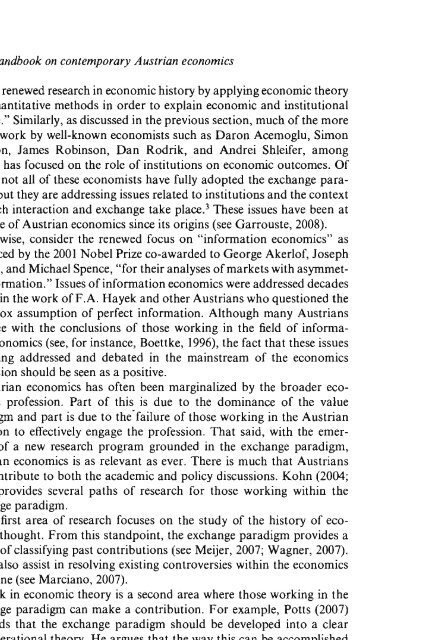Handbook on Contemporary Austrian Economics
Handbook on Contemporary Austrian Economics
Handbook on Contemporary Austrian Economics
Create successful ePaper yourself
Turn your PDF publications into a flip-book with our unique Google optimized e-Paper software.
26 <str<strong>on</strong>g>Handbook</str<strong>on</strong>g> <strong>on</strong> c<strong>on</strong>temporary <strong>Austrian</strong> ec<strong>on</strong>omics<br />
having renewed research in ec<strong>on</strong>omic history by applying ec<strong>on</strong>omic theory<br />
and quantitative methods in order to explain ec<strong>on</strong>omic and instituti<strong>on</strong>al<br />
change." Similarly, as discussed in the previous secti<strong>on</strong>, much of the more<br />
recent work by well-known ec<strong>on</strong>omists such as Dar<strong>on</strong> Acemoglu, Sim<strong>on</strong><br />
Johns<strong>on</strong>, James Robins<strong>on</strong>, Dan Rodrik, and Andrei Shleifer, am<strong>on</strong>g<br />
others, has focused <strong>on</strong> the role of instituti<strong>on</strong>s <strong>on</strong> ec<strong>on</strong>omic outcomes. Of<br />
course not all of these ec<strong>on</strong>omists have fully adopted the exchange paradigm,<br />
but they are addressing issues related to instituti<strong>on</strong>s and the c<strong>on</strong>text<br />
in which interacti<strong>on</strong> and exchange take place. 3 These issues have been at<br />
the core of <strong>Austrian</strong> ec<strong>on</strong>omics since its origins (see Garrouste, 2008).<br />
Likewise, c<strong>on</strong>sider the renewed focus <strong>on</strong> "informati<strong>on</strong> ec<strong>on</strong>omics" as<br />
evidenced by the 2001 Nobel Prize co-awarded to George Akerlof, Joseph<br />
Stiglitz, and Michael Spence, "for their analyses of markets with asymmetric<br />
informati<strong>on</strong>." Issues of informati<strong>on</strong> ec<strong>on</strong>omics were addressed decades<br />
earlier in the work ofF.A. Hayek and other <strong>Austrian</strong>s who questi<strong>on</strong>ed the<br />
orthodox assumpti<strong>on</strong> of perfect informati<strong>on</strong>. Although many <strong>Austrian</strong>s<br />
disagree with the c<strong>on</strong>clusi<strong>on</strong>s of those working in the field of informati<strong>on</strong><br />
ec<strong>on</strong>omics (see, for instance, Boettke, 1996), the fact that these issues<br />
are being addressed and debated in the mainstream of the ec<strong>on</strong>omics<br />
professi<strong>on</strong> should be seen as a positive.<br />
<strong>Austrian</strong> ec<strong>on</strong>omics has often been marginalized by the broader ec<strong>on</strong>omics<br />
professi<strong>on</strong>. Part of this is due to the dominance of the value<br />
paradigm and part is due to the' failure of those working in the <strong>Austrian</strong><br />
traditi<strong>on</strong> to effectively engage the professi<strong>on</strong>. That said, with the emergence<br />
of a new research program grounded in the exchange paradigm,<br />
<strong>Austrian</strong> ec<strong>on</strong>omics is as relevant as ever. There is much that <strong>Austrian</strong>s<br />
can c<strong>on</strong>tribute to both the academic and policy discussi<strong>on</strong>s. Kohn (2004;<br />
2007) provides several paths of research for those working within the<br />
exchange paradigm.<br />
The first area of research focuses <strong>on</strong> the study of the history of ec<strong>on</strong>omic<br />
thought. From this standpoint, the exchange paradigm provides a<br />
means of classifying past c<strong>on</strong>tributi<strong>on</strong>s (see Meijer, 2007; Wagner, 2007).<br />
It can also assist in resolving existing c<strong>on</strong>troversies within the ec<strong>on</strong>omics<br />
discipline (see Marciano, 2007).<br />
Work in ec<strong>on</strong>omic theory is a sec<strong>on</strong>d area where those working in the<br />
exchange paradigm can make a c<strong>on</strong>tributi<strong>on</strong>. For example, Potts (2007)<br />
c<strong>on</strong>tends that the exchange paradigm should be dev~loped into a clear<br />
and operati<strong>on</strong>al theory. He argues that the way this can be accomplished<br />
is by merging the exchange paradigm with evoluti<strong>on</strong>ary ec<strong>on</strong>omics. Axtell<br />
(2007) argues that agent-based modeling offers the best means of clearly<br />
articulating the exchange paradigm.<br />
A final area where adherents of the exchange paradigm can make a

















